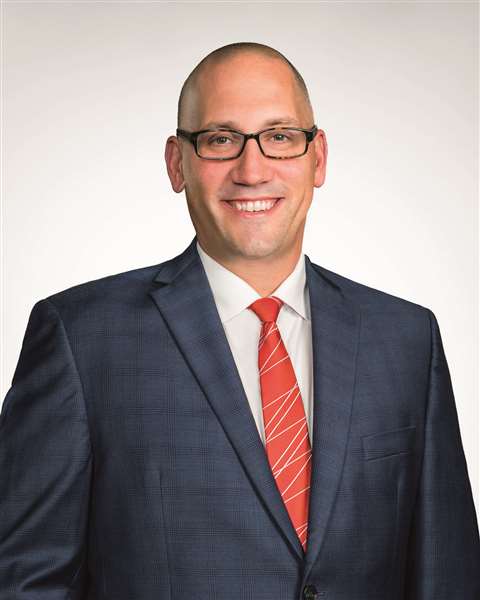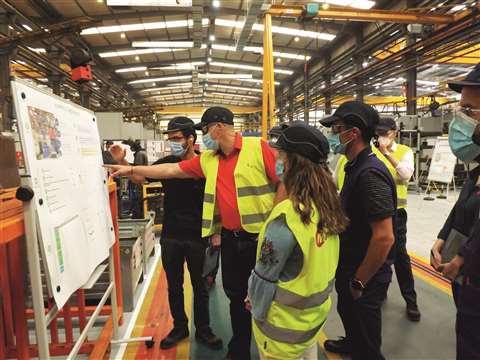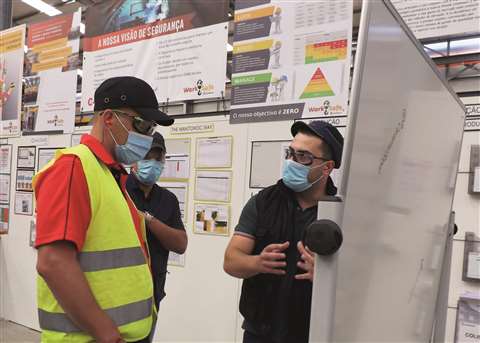Ravenscroft talks Manitowoc growth strategy
31 August 2021
D.Ann Shiffler caught up with Manitowoc’s Aaron Ravenscroft to discuss the company’s recent acquisitions.
Almost a year to the date that Aaron Ravenscroft was named president and CEO of Manitowoc, the company announced that it was acquiring the crane business of H&E Equipment Services.
 Aaron Ravenscroft, President and CEO, Manitowoc Cranes
Aaron Ravenscroft, President and CEO, Manitowoc Cranes
The July 2021 announcement was big news for the company that had been navigating a tenuous crane market during a global pandemic. Almost a year to the date that I spoke to Ravenscroft for our September 2020 Interview article, I spoke to him again this August to discuss the acquisition and what it meant for the company.
During that video call, I asked him if he expected Manitowoc the company to purchase more dealers or service businesses, and he said, definitively, “yes.” And then two weeks later the company announced that it had purchased the assets of Aspen Equipment Company, a diversified crane dealer and a final-stage, purpose-built work truck upfitter.
With the Covid-19 pandemic still wreaking havoc in the U.S., Manitowoc is stepping up and changing its traditional playbook. Ravenscroft lent a lot of perspective to the company’s strategy going forward. Through these two acquisitions, Ravenscroft has shown that the company is taking an active role in growing its market share. Manitowoc has already created a new division, MGX Equipment Services, that will operate its distributorships and provide aftermarket support.
You recently marked your one-year anniversary as president and CEO of Manitowoc. How do you characterize the past year as far as the company’s performance?
It’s been a year of transition. On one-hand, the world has been transitioning back to normal, which has brought plenty of supply chain dislocations. On the other hand, Manitowoc has transitioned to the next phase of the game. We spent five years focused on reducing cost in order to be a sustainable stand-alone crane company. Today, we’re focused on thriving and growing and taking market share in the crane market.
What lessons have you learned from running a global crane company during a global pandemic? Has Covid-19 changed the way Manitowoc does business?
Like every other company, we’ve learned to be more flexible in terms of the way that we do our work, for example using Teams, working virtually and relying on more remote diagnostic capability. What I find really unique about Manitowoc’s situation is that the pandemic gave us a certain level of confidence – we proved a lot to ourselves. We proved that all of the difficult actions that we took over the last five years to reduce costs were the right decisions. Moreover, we became resolute in our strategy to grow our aftermarket and reduce our cyclicality. In the crane business, the next market cycle is just around the corner, and we want to be in a position to gain market share as we go through the downturn. In the past, our mentality was more about surviving the next downturn, rather than using the downturn as an opportunity to strengthen our position.
How did the deal with H&E unfold?
Like any deal of this type, it’s not a straightforward thing. We have regular conversations with our dealers, and we stay close to their business. I’d say this deal just sort of happened based on these conversations.
H&E had been going through some strategic decision-making about where they wanted to go in terms of growth. They had been reducing their crane fleet for several years. They had 450 rough terrain cranes eight years ago. The level of investment in the crane business was changing and we wanted to understand where they wanted to invest their money long-term. As the crane market has changed over the last 20 years, it was more attractive to invest in other parts of the equipment rental business.
 Earlier this summer, Manitowoc President and CEO Aaron Ravenscroft visited the company’s European manufacturing facilities to review progress on lean initiatives as part of the company’s focus on continuous improvement (“kaizen”).
Earlier this summer, Manitowoc President and CEO Aaron Ravenscroft visited the company’s European manufacturing facilities to review progress on lean initiatives as part of the company’s focus on continuous improvement (“kaizen”).
What has been the reaction of your distributor network to this acquisition?
We have long-term relationships with our distributor partners. Business is all about confidence and relationships. I don’t think it was a huge concern for them, although it was a surprising development. We are following the same rules and business process that we always have. In this case, we will own some of the distributorships. It’s something we’ve done in the past and something that other OEMs have done.
A lot of our dealers realize that the stronger my neighbor is, the better off we will be. It’s all about selling more cranes. Every dealer territory is unique with a discrete contract and market coverage.
Are your dealers concerned about this change in distribution philosophy?
As I said, I met with several of our dealer principals, and we’ve talked to all of them. They had questions, but I felt comfortable with how we left things. We benefit from the fact we have such long relationships and partnerships, and we have done a good job of establishing a record of doing what we say we will do. We have transparent conversations, and we put concerns on the table. We want our dealers to succeed, to sell as many of our cranes as possible.
Again, it’s not like H&E’s crane business was for sale. This deal just evolved. For sure, if we have someone not getting their fair share of the market and it reaches the point that the crane business continues to consolidate, we can’t have any region not be competitive. Then it may be the best scenario for Manitowoc to acquire that business, rather than someone else.
I have my reservations about some of the private equity investments. The dealership world doesn’t always line up with the financial world.
Will you consider expanding the H&E operation, now MGX, beyond its current footprint?
Yes. I fully anticipate buying other dealers. I am sure there will be more dealers in this situation. Succession planning is always happening, and we do have a couple of territories that are open.
How do you envision bringing the H&E business into the Manitowoc distribution network?
It’s a carve out and asset deal. When we go live, when the deal closes, it will be a part of MGX Equipment Services, LLC. This is a legal entity, and it will house all our dealerships. Right now, the focus is closing the acquisition and bringing their employees into the fold.
These new team members include a substantial portion of field service folks, among the 225 employees. This will be a competitive strength right from the start. Finding a good service technician is one of the hardest parts of the crane business. We are very excited about this new team.
Our Number One priority right now is getting all the employees joining us from H&E and getting them stabilized, on board and comfortable with Manitowoc and focused on selling and servicing cranes. We will run it as an independent, profitable business. It won’t be integrated into the manufacturing operations. We will track this division’s success just like we do our other dealers. We will be fair and play by the rules.
 Manitowoc’s Aaron Ravenscroft believes in the crane business, “relationships mean everything.”
Manitowoc’s Aaron Ravenscroft believes in the crane business, “relationships mean everything.”
Moving forward, do you envision a model of bringing all distribution and service in-house, similar to Liebherr’s set up in the U.S.?
Maybe, but it would be over a long, long period of time. In the short term, no. These assets don’t have succession-planning issues. Dealerships don’t change hands very often. If this happened in my lifetime, it would be because I had a hell of a run.
It’s hard to get out of the crane business once you are in it. Not many companies are ready to hand over their businesses, and we love the entrepreneurial spirit of our dealers. So, this is not an active initiative. We will continue to maintain our dealer network, and we will own a few of them.
Private equity has actively pursued a lot of distributors and dealers in the industrial space. This hasn’t been a good thing necessarily. These companies need to have an exit strategy and that’s when it gets complicated. Historically, we enjoy working with these family businesses. The crane business is unique. Relationships mean everything. But over time, you have these families that want to get out of the business. If this means buying one of these companies, we may make that move.
The takeaway is that we spent five years becoming a sustainable, stand-alone crane company. Today we are starting to turn the corner and focus on aggressively growing the business.
Was the H&E crane business profitable?
Yes, it was. We feel very good about the valuation. It’s a good deal for both of us. We wouldn’t have paid $130 million if it wasn’t.
Will Manitowoc compete with its main customers?
We have no intention of doing that. It is not our intent to compete as a crane operating company. We will sell and service our cranes and provide parts, long-term rentals and rent to help someone do a project.
We see this as an opportunity to sell more cranes and to get more cranes into customers’ hands. We will work closely with the crane operating companies to manage their fleets with Manitowoc cranes. If someone prefers to rent a crane for a couple years before they potentially buy it, we will rent it. But we will not operate cranes. We have no intention of hiring crane operators.
What about the encore program that involves repairing and restoring older cranes?
H&E was our largest EnCORE dealer. We plan to continue this work and see it gain momentum.
You mentioned that the company has four strategic initiatives that it is focusing on achieving. What are these four initiatives? How do you rate/assess the company’s performance at achieving these initiatives?
We remain committed to our four strategic growth initiatives: grow our tower crane rental and aftermarket business in Europe; build out our China and Belt & Road tower crane business; accelerate our new product development in all-terrains; and expand our aftermarket activities in North America.
These initiatives will strengthen our market positions and put us in a position to grow the long-term value of the business through the cycle. We’ve only just begun to turn the flywheel on these initiatives, but I’m confident that we’re positioned well to show good gains a year from now when we get to Bauma 2022.
What is the status of Manitowoc’s tower crane rental business in Europe? Do you envision that sort of operation in the United States?
Our European tower crane rental fleet strategy is on track, and we anticipate getting to our target level within three years. We’ll invest $15 million of capex into our fleet this year. Our focus at this time is to grow in Europe, and I don’t envision any major change in our approach in the U.S.
It appears that an infrastructure bill will pass Congress. How do you think this will impact the crane business, short term and long term?
Any infrastructure bill that the government passes will be beneficial to the crane industry. My biggest concern is that there’s an actual plan for how and where the money is spent, such that it doesn’t create a boom-bust scenario.
What is your best advice for a young person starting out in the crane industry?
Own your mistakes, and don’t be afraid to ask for help.
STAY CONNECTED



Receive the information you need when you need it through our world-leading magazines, newsletters and daily briefings.
CONNECT WITH THE TEAM








